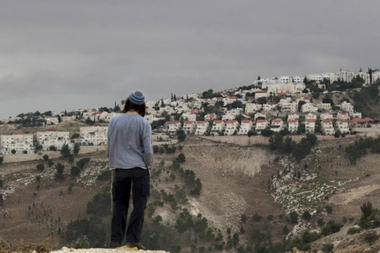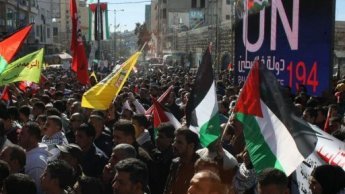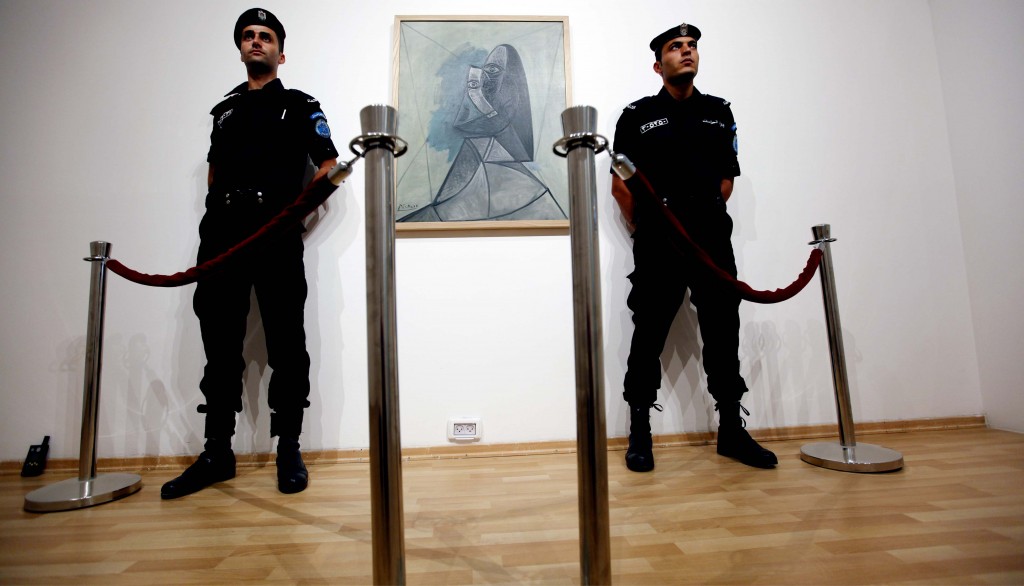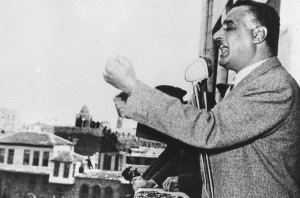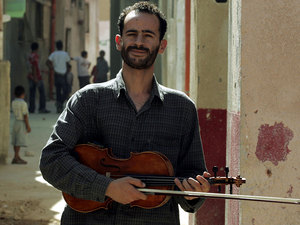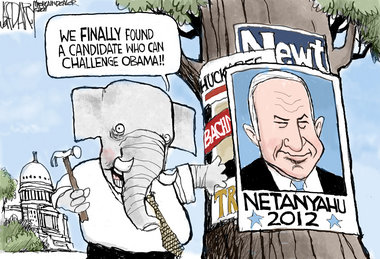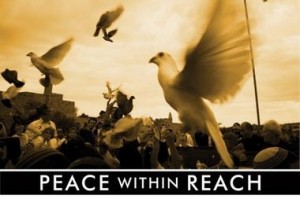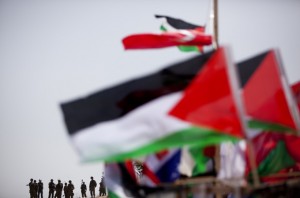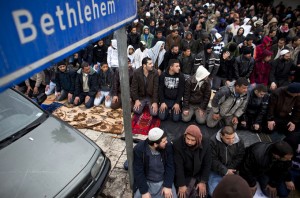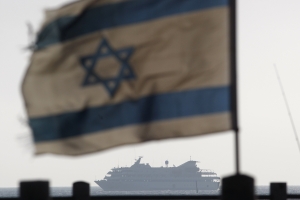Among the many things ultimately at stake in the first democratic elections in Egypt in decades is the price of food. High prices — for bread, in particular — helped fuel the protests in Tahrir Square back in January. Experts say that if Egypt’s going to have any chance at feeding its 85 million people, it needs a food policy do-over. Food for 9 Billion, a collaboration between Marketplace Radio (US), the PBS Newshour (US), the Center for Investigative Reporting and Homelands Productions, is about the global challenge of feeding a growing world. Click here for Sandy Tolan’s report from Marketplace, on the market realities of food independence, produced with Charlotte Buchen. Click here for PBS Newshour piece by Tolan and Buchen. And click on “view full post” below for their analysis of the issue of food sovereignty in Egypt.
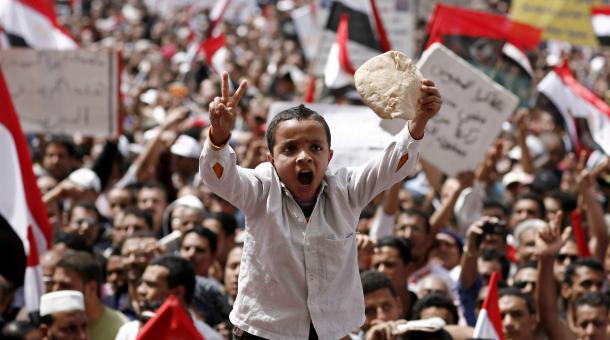
Egypt: Food for a revolution
By Sandy Tolan and Charlotte Buchen
In 2008, three years before Egyptians rose up against President Hosni Mubarak, the global food crisis provided a hint of what was to come. As world oil prices rose and Western countries planted ever more acres for biofuels instead of people, food prices skyrocketed. Suddenly, cooking oil, tomatoes, lentils, rice and even bread soared out of reach for many families. Riots and protests broke out around the world. In Egypt, fights erupted in the subsidized bread lines and five Egyptians died in the clashes. Three years later, memories of 2008 were still fresh: groundwork for the revolution.
“The revolution started because of the price increase, but in the old days, nothing like this happened before,” recalls Sabah Orany Saber, standing outside a discount produce market that caters to the servant class in the wealthy 6th of October neighborhood, near Cairo. “Now, everything is expensive. We used to eat off of our land and crops.”
Sabah; her husband, Qotb; and their children were once a farm family. They lived with Qotb’s parents and siblings near the family farm in Al-Fayoum, two hours southwest of Cairo. Several years ago, Qotb and Sabah brought three of their four children to the capital. They share a single room in a villa, where Qotb works as a chauffeur and night watchman. Now, instead of seeking higher prices for their produce, the urban migrants want affordable food: Like many of the estimated 40 percent of Egyptians who earn less than $2 a day, the family spends more than half its income on food.
“In Egypt, this price crisis has not come down for the common family; the prices of food are a daily crisis,” says Philip Rizk, an Egyptian filmmaker and activist who spent nearly every day at Tahrir Square during the January 25 revolution. “Most people can’t even afford protesting anymore because they’re not formally employed, which means you have to scrounge for work day in and day out.”
“Life was getting harder there for me and my father, and income was getting more limited, so I came to Cairo,” Qotb recalls. “I left so much behind. I left my heritage and land of origin, the village I was raised in, but, in the end, this is life. This is the reality. Until God makes it easier and we can stand on our feet, we are taking it step by step.”
The family’s journey to Cairo is part of a massive urban migration that is transforming Egyptian politics. More than 1 million peasant farmers – some estimates say closer to 4 million – have quit the land in the last 20 years. Among the factors driving this migration are escalating land prices; a farm policy that favors wealthy entrepreneurs; dwindling access to irrigation water, blamed on corruption under Mubarak; and population growth, leaving too many mouths to feed on small pieces of land.
For millennia, it wasn’t like that. Egypt was a nation of farmers. Blessed by the fertile silt of the Nile, they produced daily bread for the whole nation. Egypt had a secure food supply created at home. Now, in a global economy and with 85 million people, Egypt is the world’s biggest importer of wheat. Much of it comes from the U.S. and Russia. Under the Mubarak regime, this shift accelerated, as more and more Egyptian agriculture focused on high-value cash crops for export.
“I went to look at the land where the factory would be built, and it was just pure desert,” recalls Tarek Tawfik, an American-educated Egyptian entrepreneur.
In the late 1980s, encouraged by the U.S. Agency for International Development, Mubarak invited Egyptian entrepreneurs to come to the desert lands. Tawfik was among the first to answer the call.
“I said, ‘For heaven’s sake, this is where I’m going to be working?’ ” Tawfik remembers. “It was depressing. And then in no time, there was this factory built up, farms set up. Three or four other factories mushroomed out of this factory. We were the first company to go and farm potatoes in the middle of the desert, out of nowhere. People thought that we were lunatics.”
Today, factory farms line the desert road between Cairo and Alexandria, part of the 1,000 percent rise in the nation’s agricultural exports over the past two decades – to more than $1 billion in 2005. Under Mubarak, Egyptian businessmen like Tawfik flocked to the desert, growing, freezing, packaging and exporting grapes, strawberries, mixed vegetables and other luxury produce for the European table.
Meanwhile, some Egyptian and other agriculture and rural development experts question this policy. They ask why, when we’re already importing most of our basic staple like wheat, are we sending fancy fruit to the French? Under the free market concept of comparative advantage, promulgated in Egypt beginning in the early 1980s by USAID, the idea is to grow what you can for domestic consumption, and for the rest, raise cash by exporting high-value crops.
But this was not a classic free market. Incentives included cheap power, water, land and credit. Much of the work on factory farms is mechanized, critics say, so comparatively few jobs were created. Profits went straight back to investors and to pay off Egypt’s debt, rather than trickling down to ordinary Egyptians.
“This major plank of USAID’s programme,” wrote Ray Bush, professor of African studies and development politics at the University of Leeds in the United Kingdom, “has encouraged the production and export of strawberries for European out of season dinner tables, but this fruit and the export of vegetables does not seem to offer Egypt an escape route from its persistent agricultural underachievement. … Export revenue to compensate for low staple food production does not seem a useful way forward for Egyptian agriculture.”
Some Egyptian critics use sharper language. “Crony capitalism,” declares Magda Kandil, executive director of the Egyptian Center for Economic Studies.
“Basically, you have an entrepreneur who is well connected to people with high authority,” she says. “They’ve been capitalizing on connections that the average farmer cannot have in terms of marketing, economy of scale, access to water, access to technology, access to subsidized fuel, access to subsidized fertilizers. You end up milking a lot of the benefits for yourself. So I’m against this model because it doesn’t help the social agenda.”
Another thing that didn’t help: Egyptian laws that helped force more than a million farmers off their land. Under Law 96 of 1992, many lands given to small farmers under President Gamal Abdel Nasser’s land reform program in the early 1950s suddenly were returned to the original landlords. This was part of a broader strategy of “market-based reforms” encouraged by USAID, the World Bank and the International Monetary Fund. Rents for tenant farmers shot up by as much as 1,000 percent, according to Bush, the University of Leeds professor; others faced brutal evictions by Egyptian security forces.
Farmers who fought to stay sometimes paid the ultimate price: Between 1998 and 2000, according to the Egypt-based Land Center for Human Rights, 119 people died and 846 were injured in violence related to Law 96. The law – combined with other factors, like large families, tight credit, expensive fertilizer and water scarcity – prompted the exodus to the Gulf states, Suez, Alexandria and Cairo.
“Life was harder there on me and my father,” recalls Qotb, the chauffeur and night watchman. “So I came to Cairo.”
When he can, Qotb climbs into a packed microbus and rides southwest to Al-Fayoum to bring some cash to his father, who still works the parched land. At dusk on a warm evening, the two men walked side by side on the dry, cracked 2 acres the family received from Nasser.
“There’s no water,” Qotb’s father repeatedly exclaims. The family grows some corn and prickly pear cactus fruit, but not much else.
Under Mubarak, families here say, water was steadily diverted toward crony projects. Now, Qotb’s father gets only a slow trickle once a week.
“Look right here,” commands Hussein Abdel Wahab Heyba, Qotb’s neighbor, standing in front of a water diversion gate in Al-Fayoum. “This is our main source of water, what used to cultivate all our old land from before.”
He and other farmers here say the government stole the water, redirecting it to help a rich man’s desert bloom. “It was given to the cronies, to the families, to the well-connected people,” he says.
Here, farmers fought with local police over which direction the water would flow. At one point, Hussein says, gun battles broke out. “This is why there was a revolution.”
When Mubarak fell, Hussein was on his way to Tahrir Square, part of a rotation of Al-Fayoum farmers fighting the corruption they say was helping force them off their land. Eighty percent of his generation has already left, he says, helping create a massive urban class that increasingly depends on imported food. Egypt, once self-sufficient in food production, now imports more than half of its staples, including the source of Egyptian baladi: its daily bread. Some say Egypt is now vulnerable to international price spikes or the political agendas of wheat-growing countries.
“You cannot guarantee the price of the international market, you cannot guarantee … that one day every (nation) will (not) keep his wheat to himself,” says Mamdou Hamza, a well-connected civil engineer who became a harsh critic of the Mubarak regime.
During the revolution, Hamza “adopted” scores of young people, providing counsel and encouragement and becoming a kind of godfather of the revolution. “Last year, Russia said, ‘I’m not going to export wheat.’ So (did) India. People could use it strategically against us to push us to do things we would not otherwise like to do. It could happen.”
For a stable Egypt, Hamza believes new leaders need to focus on growing more food at home. “We must have at least 80 percent strategically produced in this country,” he says.
This may prove difficult at a time when elaborate policy shifts are a lower priority for a new parliament struggling simply to assert its independence amidst military control.
But Hamza says the work must begin now. This would mean making more efficient use of irrigation, creating farmer cooperatives on larger plots, and preventing developers from gobbling up the mere 5 percent of Egypt’s farmland that is suitable for agriculture.
“If you don’t eat with your hand in the farm to produce your food,” says Hamza, reciting an old Egyptian proverb, “you will not be able to think with your own brain. Somebody will think for you.” And who will that be? The person “who will feed you.”
Qotb and Sabah no longer eat by their own hand. A laborer of the landless class, Qotb still dreams of going back to Al-Fayoum. “We could have worked together as one big family instead of being divided,” he says. “I dream about it all the time, but I don’t have the money to support that dream or to go back home.”
Now the family is part of an urban force, demanding lower food prices and access to education as the price for peace under a new regime. On Dec. 12, in the second round of parliamentary elections, Qotb and Sabah, with their children in mind, will vote in a free election for the first time.
###
